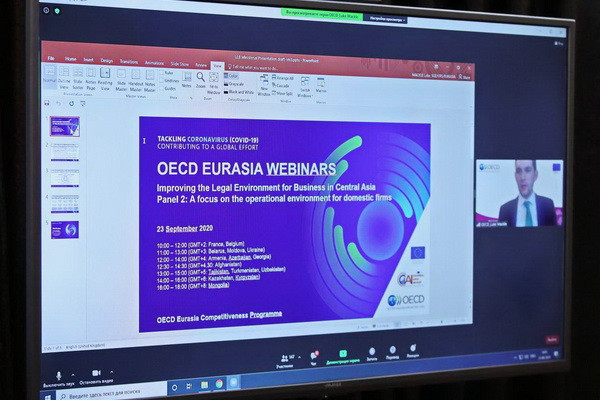On 23 September 2020, in the format of a video conference, a regional webinar of the Organization for Economic Cooperation and Development (OECD) was held on the topic: “Improving the legal environment for entrepreneurship in Central Asian countries”, which was attended by members of governments, heads of ministries and departments of the investment and economic blocs of the countries of the region, as well as the heads of the EU missions and international financial institutions.
The webinar was divided into a number of thematic discussions, the topic, one of which was the general conditions for investment and trade in the countries of Central Asia. Within the framework of this discussion, the results of the assessment of the legal environment of entrepreneurship and investment activities in the countries of the region, carried out by OECD experts, were discussed.
It should be noted that this year Uzbekistan for the first time was included in the OECD Index of Regulatory Restrictions on Foreign Direct Investment, which is an indicator of the degree of openness of the economies of various countries for foreign investors. The position of a particular country in the Index is determined based on the absence of existing restrictions on the equity participation of foreign investors in enterprises, the need to obtain additional permits, restrictions on the hiring of key personnel and other factors that may impede the attraction of foreign investment to the country’s economy.
Thanks to institutional improvements and large-scale reforms in the investment and economic spheres, effective interaction of relevant ministries and departments to improve the business environment and investment climate, Uzbekistan ranked 43rd among 83 countries included in the Index, ahead of its closest neighbors – Kazakhstan (56th place), Tajikistan (58th place) and Kyrgyzstan (62nd place).
It should also be noted that, according to the rating, Uzbekistan has significantly fewer regulatory restrictions on foreign investors’ activities than in countries such as Poland (44th place), Switzerland (49th place), USA (52nd place), South Korea (61st), Canada (66th) and Russia (77th). At the same time, the first place in the ranking went to Luxembourg, followed by Slovenia, Portugal, Romania and the Czech Republic, and the last places were shared by the Philippines, Palestine, Algeria and Libya.
The Republic of Uzbekistan was represented at the event by Deputy Prime Minister – Minister of Investments and Foreign Trade of the Republic of Uzbekistan S. Umurzakov, who noted in his speech the importance of expanding mutually beneficial cooperation between the countries of the region with the practical assistance of the OECD. He also outlined the main areas of systematic work to eliminate barriers hindering investment and innovation activity of business in the Republic – the formation of a competitive model of the economy through the gradual privatization of the banking sector, the development of public-private partnership tools to attract investment in infrastructure, digitalization of interaction between the state and investors. , stimulating the legalization of capital and building an effective investment policy focused on using the most promising industries that can become points of economic growth and technological breakthrough.
As part of the webinar, a number of discussions were also held on certain aspects of investment, trade and improvement of the legal environment in the field of entrepreneurship, in which the Minister of Justice of the Republic of Uzbekistan R. Davletov, Minister of Trade and Integration of the Republic of Kazakhstan B. Sultanov, Minister of Economy of the Kyrgyz Republic S .Mukanbetov, Chairman of the State Committee for Investments and State Property Management of the Republic of Tajikistan F. Khamralizoda and other heads of relevant ministries and departments of the countries of the region.
As a result of the event, the conference participants expressed their strong interest in the further implementation of joint projects with the OECD and the EU aimed at improving the legal environment for small and medium-sized businesses, developing mutual trade, as well as further increasing the export potential of Central Asian countries.







